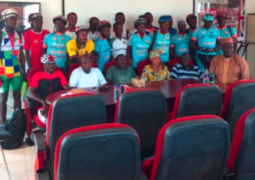
Officials from the Food and Agriculture Organization (FAO) accompanied by senior government officials from the Ministry of Agriculture and other development partners conducted a three-day tour to FSCA Project sites in the Central River and North Bank regions over the weekend.
The tour was held to meet village women and see the work being done at community farms in the project sites as well as to discuss with the women the way forward in sustaining the projects.
Speaking in an interview with The Point, at Jargen village in CRR North, Amie Jallow-Jatta, the project manager, thanked the women of Jargen community for making best use of the project by growing a big pepper farm.
It was very important to visit the area and see what the beneficiaries have done during the two-year intervention of the project, she said.
Jatta said pepper production is promoted from the local community and goes globally in processing it.
Madam Jallow-Jatta added that since they introduced the projects, the women gardeners have received many training on and through the project.
She said the aim of the project is to teach them to have high standard of processing pepper to match the international market.
She told journalists that the FSCA project being implemented in The Gambia is one of the seven projects funded by the Italian Government Trust Fund within the West Africa Region.
“The objective of the project is to increase on a sustainable basis the agricultural productivity, marketed output and incomes of project beneficiaries’ farmer based organizations FBOs and small-scale agro-processors resulting in improved livelihoods and food security,” she said.
According to her, the project, which will run for three years, focuses on food security through commercialization of agriculture.
It will assist smallholder farmers and small-scale food processors to overcome production constraints and add value through improved production processing and marketing techniques.
The project aims to build on the achievements and lessons learned from the past and ongoing interventions, and fully exploit potential synergies and complementary with ongoing and or planned government and development partners’ interventions.
The project is being implemented in two regions of The Gambia, North Bank Region and Central River Region North, and it emphasizes the representation of women in group leadership and among farmer facilitators, as well as targeting the most vunerable and food insecure members in the communities.
Asheme Coley, deputy permanent secretary at the Ministry of Agriculture, thanked the women in all the visited villages for making the best use of the project.
The project has come purposely to help village communities, particularly women, he said, adding that since they started working with FSCA they have been trained in many areas to carry out their work with proficiency.
The DPS called on the villages to make good use of the facilities being given to them by the FSCA, adding that even if the project finishes they would be able to sustain themselves through what they have learnt from the training.
The project will go forward because the project comes to help farmers,” he said.
Lamin A. Marong, farm coordinator at Jargen, commended the FSCA for what they have done for them.
He said that since they started working with the project they have improved a lot in pepper processing as well as sell in better price, adding that the village is known for pepper production.
He therefore appealed to FAO and the Ministry of Agriculture to help fight against pest on their farms, which is their major problem.
Aji Yama Njie, who spoke on behalf of the women in Jargen, said they have benefited a lot from the FSCA, particularly in pepper production.
“The FSCA met us working on pepper processing but with the coming of the FSCA this has improved processing, sh3e said. We have been working with Agriculture ministry and Action Aid before the FSCA but have learned so many things in the pepper production industry.”
The project sites visited included Lebba Malick Mbye, Jargen, Illiassa India Community Rice Farm, Kerr Jarga and other village community farms within the two regions.
The tour party also included Saidou Jallow, project communication consultant, Falalo Touray, deputy director, the Ministry of Agriculture, and Ousman Yabo, director of Tango, who all engaged communities in constructive dialogue.



